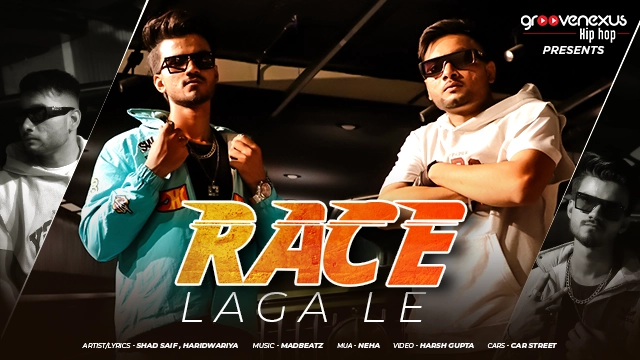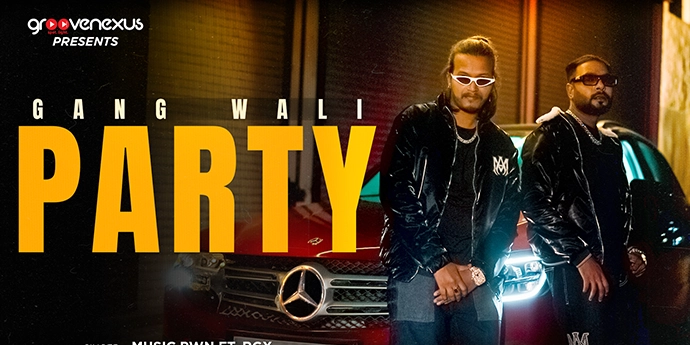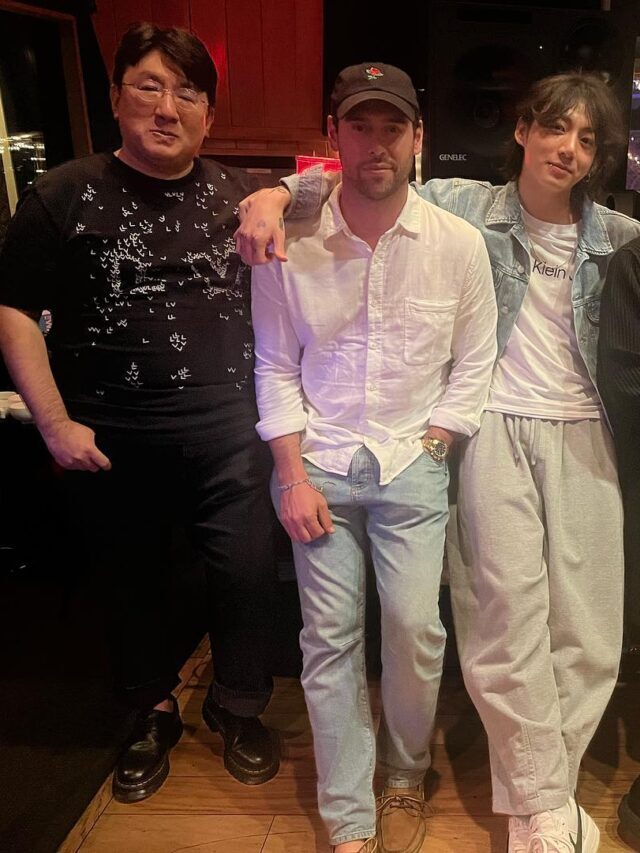Wondering how to make an EPK for music that will get you noticed by music industry professionals? This comprehensive guide describes the essential elements to add to an electronic press kit for musicians.
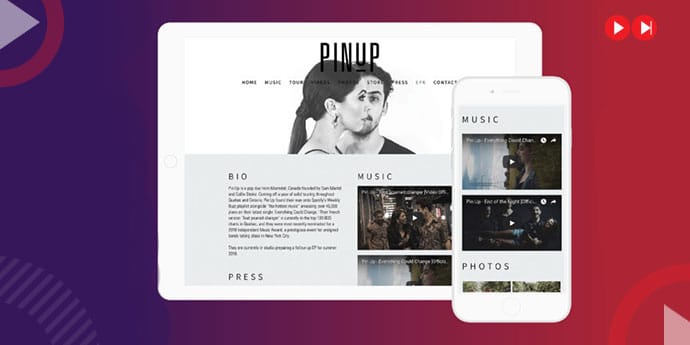
What is an EPK?
EPK, short for electronic press kit, pre-packaged set of promotional materials of a person, company, or organization distributed to media members for promotional use. An electronic press kit is often distributed to declare a release or a news conference. EPKs help businesses get recognition, whether it’s big or small, and individuals get seen by producing and providing electronic press kits to trade magazines, media outlets, and news organizations. A music artist press kit is a cost-effective promotional tool that can be put together in just a few hours and eliminates the cost and waste of printing traditional media kits.
Electronic press kit for musicians: Competition in the music industry is complex. Getting the consideration of record labels, agents, promoters, venues, and various media outlets can be implicitly impossible if you don’t propose it correctly. To promote music, EPK is very helpful for every artist. An EPK for artists should feature artist bio, music, promotional photos, tour dates, high-quality videos, relevant media, achievements, links to your social media, and contact details. Successful artist press kit represents you as an artist, your brand, and your musical identity.
Essential Things to Consider Before You Create an EPK
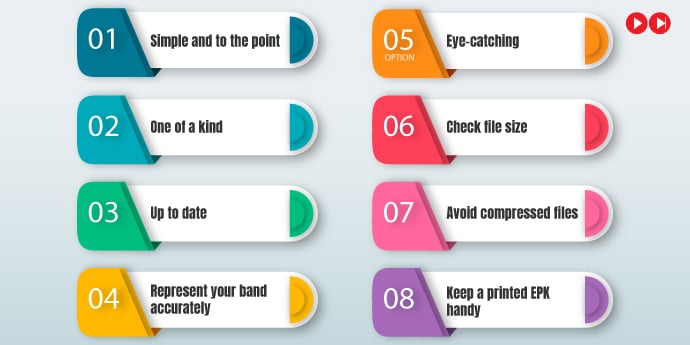
Music professionals and talent buyers review hundreds of potentials every day. It’s essential to present yourself clearly and professionally. Make your first impression a lasting one by keeping these crucial things in mind:
- Simple and to the point: Provide all your relevant information in a way that’s scannable and easy to read. Also, keep your EPK concise and relevant.
- One of a kind: Put your best foot forward, present something unique and make a great first impression.
- Up to date: Updating and organizing your press kit should only take a few moments. Always keep your EPK updated.
- Represent your band accurately: Don’t overhype, exaggerate, lie, or include irrelevant information in your EPK. Make sure to incorporate accurate and relevant information only.
- Eye-catching: Create an EPK that stands out from the competition in the music industry. Make it eye-catching and unique without going overboard.
- Check file size: Be cautious of the file size of an EPK when attaching it to emails. Large digital files may get flagged, sent to the Spam folder, or rejected by the recipient.
- Avoid compressed files: Avoid sending .zip files or other compressed file attachments with your email. These files will not get opened by the recipient.
- Keep a printed EPK handy: Always have a printed version of your EPK handy at events. You may run into industry professionals interested in knowing more about you.
How to Make an EPK for an Artist?
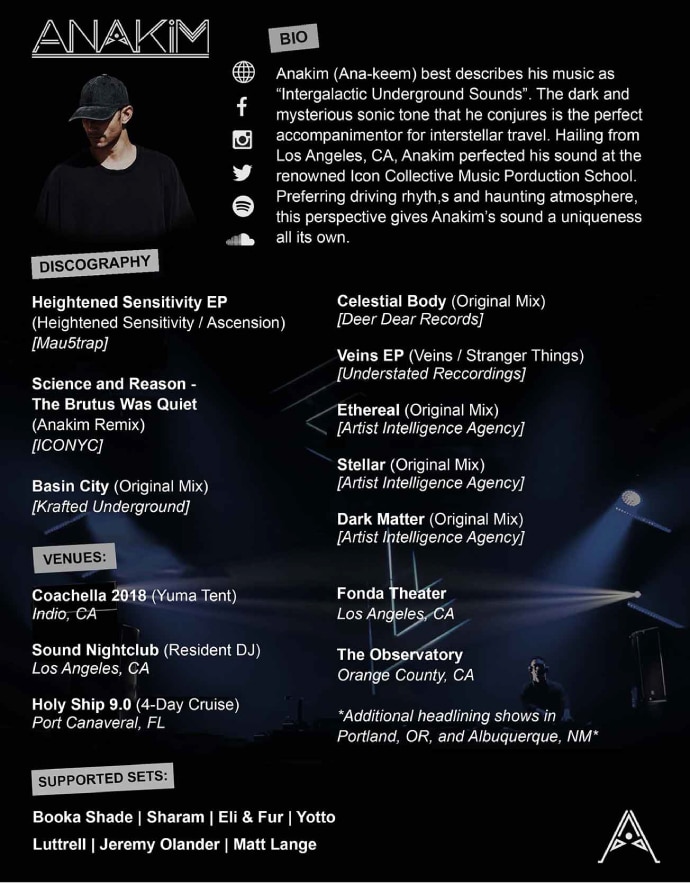
Wondering how to make an EPK for your band? Then you landed at the right place. Always remember to make an EPK that showcases your finest musical and artistic achievements. Let’s look at what should be inside an EPK.
8 Things that Must be in Electronic Press Kit of a Musician
- Write a short EPK bio
- Include links to music
- Gig dates and details
- Include any press releases in your EPK
- Use professional photos
- Embed music videos
- Note any relevant mentions
- Provide contact details
1. Short EPK bio
Telling a story and making a personal connection with your audience will bring your EPK to the next level. Your bio is a short section summarizing who you are. It shouldn’t be very wordy — two paragraphs are ideal.
In your bio, make sure you answer the following questions:
- What kind of music do you make?
- When did you start making music or your musical journey till now?
- What are your most significant achievements till now?
2. Include links to your music
The most important section is your music! Make this area as inviting as possible, and your songs should be easily accessible. Put your best foot forward and try to use the highest quality MP3 you can.
To make it easy for them, it may be best to host your music on a reputable streaming platform providing links to your songs. This way, they won’t need to download all your music to listen to it. If you don’t, yet want your music in the public domain, platforms such as YouTube and Vimeo can host your music privately while providing link-only access.
3. Gig dates and details
Make an eye-catching headline for the Gig details section. If you have any gigs lined up, make sure you list them, including the essential details such as – name of the city, time, and venue details. This will demonstrate how often you’re performing, the type of venue, and your audience’s probable size.
4. Include any press release in your EPK
You will most likely not have a press release at this stage. But there are many benefits of press release for a musician. This will come with time, and then you can document any official press release in your EPK.
Choose the most newsworthy or exciting press releases for your electronic press kit, but make sure they are recent—with nothing older than six months. These can be regularly swapped out to keep things updated and fresh. The press release heading should clearly describe its content for an easy glance if the media is looking for a specific announcement.
5. Use professional photos
Make sure you include some high-resolution photographs that can be downloaded easily. The good idea is to paste some digitized photos into your press kit and include a link to the hi-res images that are available to download.
If you haven’t gotten a photoshoot yet, get one. A few images from your shows would be great as well. Especially if they capture the “vibe” of your music and performance style. Make sure to include your art album and logo as well. Ensure these images are large (600-pixel width minimum) and high quality (300 dpi). They need to be able to be printed without any pixelization.
6. Embed music videos
Including music videos in an electronic press kit is always a good idea. They’re easily watchable and shareable. Plus, it will give the press some multimedia content to promote. Even if it’s just a lyric video or a video over-shifting image, a video will boost the odds of you getting a promotion. If you have any high-quality videos of your live performances, include those too. Show footage is an excellent way to convince promoters to book you for a gig.
7. Note any relevant mentions
Have you ever been covered in previous publications or blogs? As a budding artist, you might not have anything to show here yet. If you have got any mention in a blog on any music-related website, you can paste any quotes directly into this section and include links to the full articles.
8. Contact details
Finally, make sure you include your contact info (or your representative’s contact info). Include your email address, website URL, social media profiles, SoundCloud. If a promoter is sent this EPK by anyone other than you, they’ll have no idea how to get in touch. Don’t make it hard on them. Try to include your email (and your phone number, if you’re comfortable) on a contact page.
How much does an Electronic Press Kit Cost?
The cost of a press kit can vary. It depends on how much you spend on the content featured in it. For example, if you are doing a professional shoot for your press kit, there are costs involving the clothing, accessories, venue, and photographer. However, a standard press kit can be made for free.
There are many artist EPK examples available on the internet. If you are hard on the budget, you can create one yourself by using a free EPK template for musicians. Sonicbids, Adobe Spark, and Bandzoogle all offer great templates that you can get started with.
Who to Send an EPK to?
You should send your EPK to whoever you want to promote your music. This will most likely be journalists at music review publications. It’s best to start with smaller blogs and work your way up rather than start with the most significant sites out there.
You could also send it to radio stations for an upcoming release to help you get airplay. Sending it to promoters at venues is another good idea because it could get you gigs or even a better slot at a show. There’s never any guarantee that someone will even read your EPK but putting a great one together is a significant first step.


